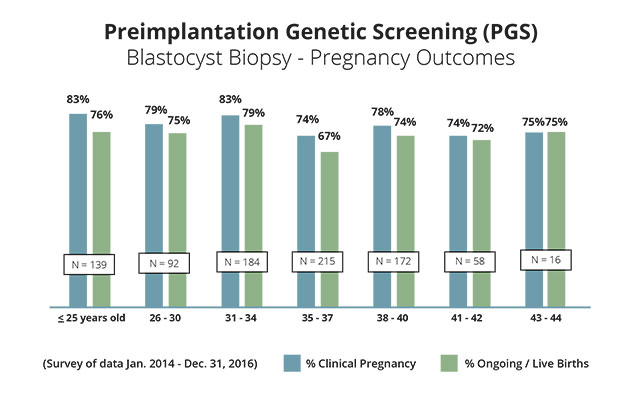When considering the reported IVF success rates there are several factors to consider.
Can all patients do IVF?
It is important to know gets treatment at the center. There may be a big difference in success rates depending on whether clinics treat all couples or just ones who are the most likely to become pregnant. Each center has their own policy about who gets IVF. There are many centers that will not treat the most difficult cases in order to maximize the IVF success rates. This means that older women or women with few remaining eggs may not have a chance to use their own eggs.
Our center has always been willing to take on even the most difficult situations. We also give each couple the best chance of getting pregnant with their own eggs. Unfortunately, when considering the data from the CDC about IVF success rates, this information is really not available about any IVF center. The CDC considers all women in each age group as being the same when reporting statistics. This is the main reason it is difficult to compare statistics based on the CDC data alone.
The Variability of an Individual’s Response to Stimulation
The fertility potential of any woman depends on the number of genetically normal eggs she has in her ovaries. Since there is tremendous variation, it is not possible to treat all women of any age in the same way. This situation is complicated by the fact that there is no available test for genetically screening eggs. The number of eggs in the ovaries is also difficult to test.
The available tests of fertility potential simply reflect the current hormonal status of the ovaries and pituitary gland. This is an indirect way of determining relatively how many eggs are available at the time of testing. For this reason it is important in maximizing IVF success to treat each woman of any age as an individual. At our center, we have many IVF protocols. We will always pick the one that best suits the needs of every individual. Centers that treat every woman with the same protocol are not maximizing success.
The Variability of a Patients Cycle From Month to Month
There is a time element that we must consider when determining when to start an IVF cycle. We have found that the number of eggs available in the ovaries can vary significantly month to month. For those women who have less than the average number of eggs this is an important consideration. We always check the status of the ovaries on a natural menstrual cycle day 3 before giving any medication. This helps us determine whether that month is a good one for starting an IVF cycle.
By counting the number of follicles on ultrasound and measuring FSH and estradiol levels, we can determine when to start treatment. Sometimes it is necessary to monitor for 2-3 months or more before starting an IVF cycle. However, in the long run, this approach is more likely to lead to a successful outcome than if an IVF cycle starts at random.
The Use of Day 5 Preimplantation Genetic Screening, PGS
 The increasing use of Primplantation Genetic Screening (PGS) has greatly improved the success of IVF.‘ Since 2011, we have been exclusively performing biopsies on day 5 embryos (blastocysts).‘ This provides a much more accurate diagnosis than biopsies performed on day 3 embryos due to the significantly lower rate of mosaicism (multiple genetic‘ cell lines).‘With the advent of Comparative Genomic Hybridization (CGH), PGS has become an extremely useful procedure. It has led to the highest pregnancy rates that we have ever seen.‘ We have found that when used on women under 40, the clinical pregnancy rate is 70%-80%, and women 41-42 years old had a clinical pregnancy rate of over 70% if at least one genetically normal embryo is transferred.” We feel therefore that PGS is a procedure that increases the efficiency of IVF in women of all ages.
The increasing use of Primplantation Genetic Screening (PGS) has greatly improved the success of IVF.‘ Since 2011, we have been exclusively performing biopsies on day 5 embryos (blastocysts).‘ This provides a much more accurate diagnosis than biopsies performed on day 3 embryos due to the significantly lower rate of mosaicism (multiple genetic‘ cell lines).‘With the advent of Comparative Genomic Hybridization (CGH), PGS has become an extremely useful procedure. It has led to the highest pregnancy rates that we have ever seen.‘ We have found that when used on women under 40, the clinical pregnancy rate is 70%-80%, and women 41-42 years old had a clinical pregnancy rate of over 70% if at least one genetically normal embryo is transferred.” We feel therefore that PGS is a procedure that increases the efficiency of IVF in women of all ages.
Please note: A comparison of clinic success rates may not be meaningful because patient medical characteristics and treatment approaches may vary from clinic to clinic.
Read about how Preimplantation Genetic Screening (PGS) has improved our IVF success rates.
Learn why overweight women have lower IVF success rates.
Read Dr. Anderson’s information on how acupuncture may improve success rates in IVF.
Read more about “A Woman’s Age and Fertility” for more information about chances for successful pregnancy.
